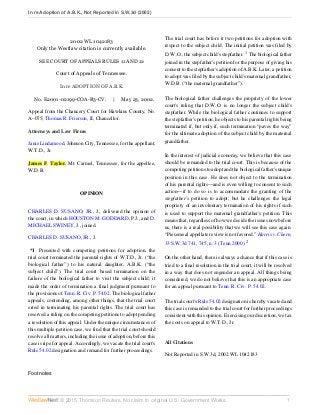In re Adoption of ABK
- 1. In re Adoption of A.B.K., Not Reported in S.W.3d (2002)
© 2015 Thomson Reuters. No claim to original U.S. Government Works. 1
2002 WL 1042183
Only the Westlaw citation is currently available.
SEE COURT OF APPEALS RULES 11 AND 12
Court of Appeals of Tennessee.
In re ADOPTION OF A.B.K.
No. E2001-02199-COA-R3-CV. | May 23, 2002.
Appeal from the Chancery Court for Hawkins County, No.
A–075; Thomas R. Frierson, II, Chancellor.
Attorneys and Law Firms
Janie Lindamood, Johnson City, Tennessee, for the appellant,
W.T.D., Jr.
James F. Taylor, Mt. Carmel, Tennessee, for the appellee,
W.D.B.
OPINION
CHARLES D. SUSANO, JR., J., delivered the opinion of
the court, in which HOUSTON M. GODDARD, P.J., and D.
MICHAEL SWINEY, J., joined.
CHARLES D. SUSANO, JR., J.
*1 Presented with competing petitions for adoption, the
trial court terminated the parental rights of W.T.D., Jr. (“the
biological father”) to his natural daughter, A.B.K. (“the
subject child”). The trial court based termination on the
failure of the biological father to visit the subject child; it
made the order of termination a final judgment pursuant to
the provisions of Tenn. R. Civ. P. 54.02. The biological father
appeals, contending, among other things, that the trial court
erred in terminating his parental rights. The trial court has
reserved a ruling on the competing petitions to adopt pending
a resolution of this appeal. Under the unique circumstances of
this multiple-petition case, we find that the trial court should
resolve all matters, including the issue of adoption, before this
case is ripe for appeal. Accordingly, we vacate the trial court's
Rule 54.02 designation and remand for further proceedings.
The trial court has before it two petitions for adoption with
respect to the subject child. The initial petition was filed by
D.W .O., the subject child's stepfather. 1
The biological father
joined in the stepfather's petition for the purpose of giving his
consent to the stepfather's adoption of A.B.K. Later, a petition
to adopt was filed by the subject child's maternal grandfather,
W.D.B. (“the maternal grandfather”).
The biological father challenges the propriety of the lower
court's ruling that D.W.O. is no longer the subject child's
stepfather. While the biological father continues to support
the stepfather's petition, he objects to his parental rights being
terminated if, but only if, such termination “paves the way”
for the ultimate adoption of the subject child by the maternal
grandfather.
In the interest of judicial economy, we believe that this case
should be remanded to the trial court. This is because of the
competing petitions to adopt and the biological father's unique
position in this case. He does not object to the termination
of his parental rights—and is even willing to consent to such
action—if to do so is to accommodate the granting of the
stepfather's petition to adopt; but he challenges the legal
propriety of an involuntary termination of his rights if such
is used to support the maternal grandfather's petition. This
means that, regardless of how we decide the issues now before
us, there is a real possibility that we will see this case again.
“Piecemeal appellate review is not favored.” Harris v. Chern,
33 S.W.3d 741, 745, n. 3 (Tenn.2000). 2
On the other hand, there is always a chance that if this case is
tried to a final resolution in the trial court, it will be resolved
in a way that does not engender an appeal. All things being
considered, we do not believe that this is an appropriate case
for an appeal pursuant to Tenn. R. Civ. P. 54.02.
The trial court's Rule 54.02 designation is hereby vacated and
this case is remanded to the trial court for further proceedings
consistent with this opinion. Exercising our discretion, we tax
the costs on appeal to W.T.D., Jr.
All Citations
Not Reported in S.W.3d, 2002 WL 1042183
Footnotes
- 2. In re Adoption of A.B.K., Not Reported in S.W.3d (2002)
© 2015 Thomson Reuters. No claim to original U.S. Government Works. 2
1 The “stepfather” was married to the subject child's mother at the time of her death on March 2, 1999. The trial court ruled
that he was no longer the subject child's stepfather, reasoning that his status as such ceased to exist upon the mother's
death. While this issue is before us, we do not reach it; however, purely for ease of reference, we will continue to refer
to the “stepfather” as such.
2 In the same footnote, the Supreme Court in Harris said the following:
Our decision today should not be read as encouraging trial courts to certify interlocutory judgments as final under
Rule 54.02, thereby requiring a litigant to file an appeal while the remainder of the litigation is ongoing....Orders
certifying interlocutory judgments as final “should not be entered routinely” and “cannot be routinely entered as a
courtesy to counsel.” Such orders must be supported by a record indicating why there is “no just reason for delay,”
and will preferably include specific findings of fact to that effect.
Id. (citations omitted).
End of Document © 2015 Thomson Reuters. No claim to original U.S. Government Works.
